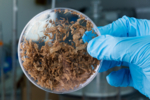-
Diatoms as a biorefinery - 05/05/2023
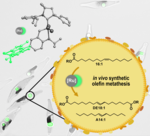
Renewable raw materials that can be used as alternatives to fossil resources already exist. However, to turn them into everyday products, plant oils and other renewable raw materials not only have to be extracted, but often have to undergo complex chemical processing. Researchers at the University of Konstanz have now converted microalgae cells into tiny refineries to produce and upgrade raw materials, creating a supply of sustainable chemicals.
https://www.biooekonomie-bw.de/en/articles/news/microalgae-sustainable-chemical-production-mini-factory
-
-
-
Press release - 26/04/2023
Ready-made meals are ideal for quickly satisfying hunger. However, the quick snacks produce a lot of environmentally harmful plastic waste. To tackle this problem, the student team EDGGY from the University of Hohenheim in Stuttgart rolled up its sleeves and developed edible packaging made from eggshells and other plant-based raw materials. And even better: they simply dissolve in the hot water and can be eaten as an additional protein boost.
https://www.biooekonomie-bw.de/en/articles/pm/Simply-EGG-genious-Students-invent-edible-packaging-from-eggshells
-
Press release - 21/04/2023
In collaboration with the project partners CG TEC, Cordenka, ElringKlinger, Fiber Engineering and Technikum Laubholz, the DITF are developing a new fiber composite material (CELLUN) with reinforcing fibers made of cellulose. The matrix of the material is a thermoplastic cellulose derivative. CELLUN made from renewable biopolymers enables the replacement of glass or carbon fibers in the production of industrial molded parts.
https://www.biooekonomie-bw.de/en/articles/pm/cellun-fiber-composite-made-biopolymers
-
Press release - 30/03/2023
Composite materials provide stability in aircraft parts, sports equipment, and everyday household items. However, most of these materials have a poor carbon footprint and are not naturally degradable. A more sustainable alternative has been developed by a team from the University of Stuttgart. This completely bio-based composite material is made of flax fibers and the biopolymer chitosan.
https://www.biooekonomie-bw.de/en/articles/pm/green-composite-material-made-flax-and-chitosan
-
-
-
-
-
-
-
-
Synergistic effects with microalgae and purple bacteria - 03/02/2023
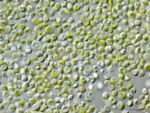
A biorefinery that uses industrial wastewater and residual material streams is being built in Rheinfelden (Baden). It will have two interlinking bioreactors and will synthesize biohydrogen as well as organic basic materials such as carotenoids and proteins. SmartBioH2-BW is a pilot project run by the Urban and Industrial Biorefineries initiative and funded by the Baden-Württemberg Ministry of the Environment, Climate Protection and Energy Sector.
https://www.biooekonomie-bw.de/en/articles/news/working-towards-hydrogen-economy-wastewater-biorefinery-smartbioh2-bw-project
-
-
-
-
Start-up 'Innovation Matters' - 19/12/2022
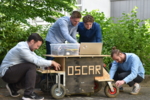
Saffron is one of the most expensive spices in the world, because picking it involves a complex manual process. This treasure therefore comes to us mostly from countries such as Iran with poor working conditions and low wages. A start-up company called Innovation Matters from Baden-Württemberg is now developing a robot-assisted, automated process that will make saffron cultivation attractive in Germany as well as ecological and fair.
https://www.biooekonomie-bw.de/en/articles/news/saffron-cultivation-germany-sustainable-support-robots
-
Project FuTuReS - 12/12/2022
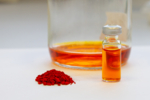
Algae are aquatic organisms that flourish in a huge variety of species. But that's not all: they are also small green mini-factories that can produce all kinds of valuable materials. All they need is water, light, CO2 and a few nutrients that can be recycled from biogas or sewage treatment plants. Researchers have now determined the optimal framework conditions and practicability of process methods for agricultural algae cultivation.
https://www.biooekonomie-bw.de/en/articles/news/microalgae-high-quality-products-domestic-agriculture
-
Press release - 08/12/2022
The German Research Foundation (DFG) has awarded the 2023 Gottfried Wilhelm Leibniz Prize to Prof. Achim Menges, head of the Institute for Computational Design and Construction at the University of Stuttgart. The award, which is endowed with EUR 2.5 million, is considered by many the most important research prize in Germany.
https://www.biooekonomie-bw.de/en/articles/pm/leibniz-preis-fuer-prof-achim-menges
-
-
-
-
-
Website address: https://www.biooekonomie-bw.de/en/search





